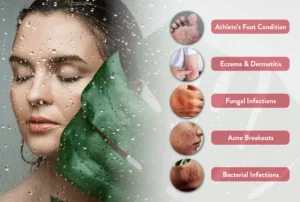While the scorching summers leave us craving for rain, the rainy season is not completely bereft of its share of problems. The most common form of these problems show up on our skin in the form of infections, rashes and so on. These skin related challenges can not only be uncomfortable to bear but can also leave behind scars that might quite literally leave a lasting impression.
But what makes the rainy season so difficult? Firstly, the fluctuating temperatures turn the skin into a breeding ground for various recurring skin problems. Secondly, given the level of humidity and sweat that the body undergoes, it is difficult to sustain a good skincare regime since skincare products leave the skin feeling more greasy and uncomfortable. Let us categorize the various causes of skin problems during monsoons:

Causes & Symptoms of Skin Problems in Monsoon:
- Fungal Infections: Thanks to the dampness and humidity of the monsoon season, fungal growth is particularly high.
- Visible Symptoms: Red, itchy rashes, commonly occurring in moist areas like underarms, groin, and between toes.
- Bacterial Infections: Triggered by increased perspiration and humidity, bacterial growth can spike up causing infections that need medical intervention.
- Visible Symptoms: Pus-filled bumps, redness, and tenderness in the affected area. They are typically triggered by increased sweating and humidity, which can promote bacterial overgrowth, especially in areas of friction.
- Acne Breakouts: When the dead skin cells start accumulating in the corners and dirt and grime pile on them further, it triggers an acne breakout due to the clogging of open pores.
- Visible Symptoms: Pimples, blackheads, and whiteheads, primarily appearing on the face.
- Eczema and Dermatitis: These are persistent skin conditions that get triggered by the level of humidity and body’s perspiration levels.
- Visible Symptoms: Red, inflamed, and itchy skin, with flare-ups whenever the skin perspires more.
- Athlete’s Foot: This is a very common condition caused by walking in wet shoes or socks.
- Visible Symptoms: Itchy, scaly rash on the feet.
So what is the solution? How can you strike the right balance to overcome these potholes? Read on to know the best monsoon skincare tips from our experts.
6 ways to Prevent Skin Infections in Monsoons:
- Maintain Skin Hygiene: Shower daily with a mild soap to keep your skin clean, and remember to pat dry yourself thoroughly after, particularly in skin folds.
- Exfoliate Regularly: Keep the piling of dead skins at bay by following a regular exfoliation routine. 2-3 times a week is good practice as it will unclog your open pores and keep it acne free.
- Wear Appropriate Clothing: Choose loose, breathable fabrics like cotton that allow your skin to breathe and change out of wet clothes promptly to avoid prolonged dampness.
- Stay Dry: Use anti-fungal powders to keep moisture-prone areas, like underarms and feet, dry and less susceptible to fungal growth.
- Avoid Sharing Personal Items: Additionally, avoid sharing personal items like towels and soaps to prevent the spread of infections and maintain personal hygiene.
- Stay Hydrated: Our skin reflects our health. So if you are hydrated from the inside the same will show up in the form of glowing skin despite the daily sweat and grime.
But despite all precautions, sometimes we cannot prevent everything. This is when you need to consult a dermatologist who will guide you in a ways to manage the different skin conditions.
5 Best Remedies For Skin Infections in Monsoons:
“Skin care is not a one time affair. It is ongoing and needs a disciplined approach.”, says Dr Ruben Bhasin Passi, our resident dermatologist at CKBH Gurgaon. She further explains, “this approach will help prevent seasonal problems and keep the skin clean and infection free.”
But if you are already facing problems, here are some of the remedies that can help manage monsoon induced skin woes:
- For Fungal Infections: Consult a dermatologist and apply antifungal/antibacterial (as applicable) creams or ointments in the affected areas.
- For systemic infections your doctor might prescribe some form of oral antibiotics.
- If acne is the problem then switch to a non-comedogenic cleanser and use twice a day to keep dead skin away.
- For eczema and dermatitis the best way is to moisturize frequently with hypoallergenic moisturizers to keep the skin hydrated.
- Doctors often prescribe calming medicated topical creams to manage the itching and discomfort.
It is quite evident that monsoons can be an extremely problematic time for the skin. This is especially true in case you already have sensitive allergy or infection prone skin. So it is always advisable to have a reliable skincare routine and consult a good dermatologist who will be able to monitor your skin concerns regularly and give you the best tips and suggestions to stay healthy. In case you or your loved ones are affected by the ill effects of the monsoon, we urge you to reach out to us and book a consultation with our team of world-class dermatologists at the CK Birla Hospital, Gurgaon.
